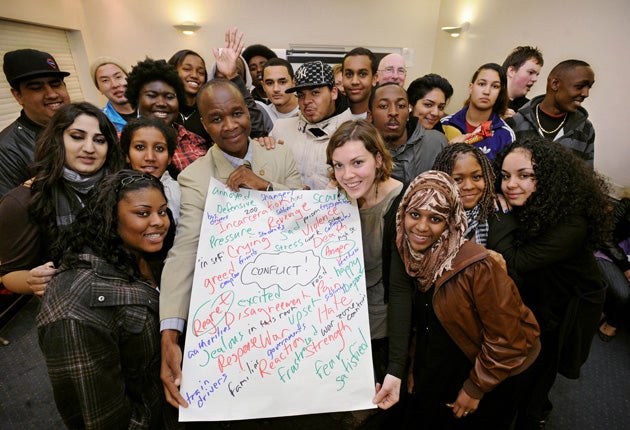Independent Appeal: Different worlds, same solutions
A former child soldier is showing Londoners how to overcome conflict

They are an unlikely couple. Albino Forquilha is 41 and a former child soldier from Mozambique. Sohail Karim is 17 and an unemployed school-leaver in the east London borough of Newham. But they have come together in the hope of each learning something about how conflict can be resolved without resorting to violence. Neither is a stranger to trouble but they come from different worlds.
Albino's introduction to violence came during the Mozambican civil war when the government gave him a gun to guard his school against the incursions of rebel guerrillas. He was 13 at the time.
"When the rebels did come I was a target because of my gun. They captured me and the three others and took us to their camp," he said. "If anyone ran away and was caught, they would be brought back and put in the middle of a circle and we then had to kill them." Those who refused were killed themselves.
"I did many atrocities," he told Sohail, and a group of other younger Londoners who have spent the past few months training in conflict resolution in the multi-ethnic borough.
Sohail, a burly crop-haired young Asian, could easily have been sucked into trouble. "I grew up on a council estate in an area where there was a lot of violence between gangs of white and Asian youths," he says. "I was a troubled person, and started to become involved in gangs. I wasn't very good at school."
The pair have been brought together as part of an initiative by Truce 2020, a project dedicated to peace-building in the area in the run-up to the 2012 Olympics. The scheme was inspired by the practice at the original Olympic Games where the ancient Greeks declared a truce for a week before and after the Games to allow competitors and spectators to attend without fear of being attacked. The initiative is supported by Peace Direct, one of the three charities for which funds are being raised by this year's Independent Christmas Appeal.
It would be easy to suppose that the tasks of building peace in post-war Mozambique and the streets of East Ham are too dissimilar for such an exchange to be fruitful. But the young Londoners sit enrapt as Albino tells the story of how a handful of ex-child soldiers, weary of the conflict, went to the government and asked it to talk to the rebels.
Officials brushed them aside many times, Albino says, before capitulating: " 'OK if you can set up a meeting we will speak to them.' So we approached the church in Maputo and through them the Vatican who agreed to host and fund the peace talks."
Yet even when the civil war was finally over there were estimated to be still two million weapons in the hands of private citizens, Albino tells Sohail and 30 other graduates of Truce's conflict resolution programme, which has trained 90 young people between the ages of 16 and 21 this year.
"Many people were still traumatised by what had happened in the war, and the devastated state of the country's economy, clinics and schools," he says. "We knew that with so many weapons in circulation the fighting could be sparked again at any time."
So Albino and several other former child soldiers launched a charity to get rid of the guns. It seemed an ambition that was well beyond their ability. But they approached the ambassadors of rich nations in the Mozambican capital and asked for contacts with groups who would provide goods to be swapped for the arms. "We asked for bicycles, sewing machines, construction materials and even tractors."
Their request chimed in the imagination of the donors. Japan alone sent 12 containers full of bikes, three times, during the first year. Before long Albino and his friends had inspired community swap schemes which collected 900,000 guns. They have created what has become one of Mozambique's major peace-building organisations.
"War does not end when the fighting stops," Albino tells the youngsters of the East end. "You need reconciliation at the grassroots level, which is what you are doing here."
The Truce graduates are a mixed group of blacks, whites and Asians. Their friendship, which has burgeoned over a series of 10-week courses, has become a living embodiment of the mediation skills in which they have been tutored.
What Albino has told them bears out what they have experienced and learned. "You have to be open," says Sohail, " then you have to set ground rules, you have to listen to the other side as well as setting out your own version of events. You have to decide exactly what it is you need from the other person, and what they want from you."
All that, he adds, is true "whether you are arguing with a parent at home, falling out with your siblings, having difficulties with a teacher at school, or squaring up to a gang from a different ethnic community."
So what has Albino taught them, the Truce project manager Klaudia Brezna asks as the evening ends. The youngsters shout their responses:
"That you don't always have to have a Plan B if you believe strongly enough in Plan A."
"That there is always something that can be done and that you shouldn't expect someone else to do it."
"That with patience just one person can make a massive difference."
"That if you put your heart and souls into something then anything is possible."
Albino smiles at the response. He has, he says, learned something too.
Subscribe to Independent Premium to bookmark this article
Want to bookmark your favourite articles and stories to read or reference later? Start your Independent Premium subscription today.

Join our commenting forum
Join thought-provoking conversations, follow other Independent readers and see their replies